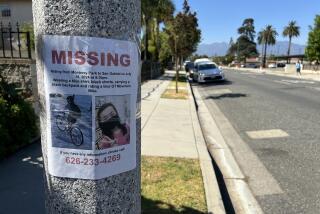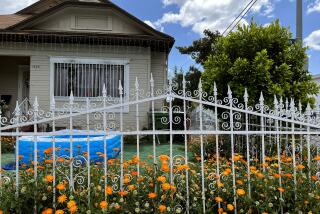Earl C. Broady Sr.; Judge Started Out as a Janitor
Earl C. Broady Sr., a pioneering black man who started out as a janitor and became a judge of the Los Angeles County Superior Court, has died. He was 87.
He died Saturday in his Beverly Hills home of cancer, his son, attorney Earl C. Broady Jr., said Monday.
“I not only was born across the tracks. I was born on the wrong side of that place across the tracks,” the senior Broady told The Times in 1964 when he became chief deputy district attorney of Los Angeles County.
The son of a school janitor who moved his family to Los Angeles at the turn of the century, Broady began working as a janitor at the age of 13. By the time he graduated from Jefferson High School, he was proficient enough as a pianist to organize a dance orchestra. For six years, he worked as a mail carrier during the day and led his band at night.
Broady began his career in criminal law in 1929 by joining the Los Angeles Police Department, in which he served for 17 years.
In court frequently to testify, he watched the proceedings carefully.
“You see things you think you can do yourself and maybe do better--mistakenly so perhaps,” he told The Times. “Besides, as a policeman who wants to do a good job, you study a good bit of law anyway, and the first thing you know you get involved in it.”
In the 1940s, he studied law in night school at USC and Los Angeles College of Law.
He passed the State Bar of California examination in 1944, and a year later left the police force with the rank of lieutenant.
Broady succeeded as a criminal defense attorney, primarily representing blacks accused of murder, although he viewed himself as having a general practice.
“I didn’t consider that I was defending Black Muslims,” he said after he defended several accused of rioting at a Los Angeles mosque. “The way I looked at it, I was representing 14 men accused of assault and violating the penal statutes of the state of California, the same way I had represented Protestants and Catholics and, in one instance, a Buddhist and some who may have had no religion.
“Religion did not enter into it as far as I’m concerned,” he said. “I’ve been a Methodist all my life. I don’t advocate the Muslims’ cause any more than I advocate the use of dope, even though I’ve represented dope addicts, and murder, even though I’ve defended murderers.”
He did argue that the religion apparently had accomplished good: “All of these defendants have kept out of trouble since joining the Black Muslims. Three once were in prison. I say the black people need more Muslims if that reduces the black population in the penitentiaries.”
Broady practiced criminal law for 19 years. He was elected president of the Criminal Courts Bar Assn. of Los Angeles, which proved a steppingstone to his appointment as the No. 2 person in the district attorney’s office. He was the first black to achieve that high a position in the district attorney’s office.
A Democrat, he was named directly to the Superior Court bench in 1965 by then-Gov. Edmund G. Brown Sr.
Among the better-known trials he presided over was that of Vaughn Greenwood, known as the Skid Row Slasher. Greenwood was convicted of nine ritualistic, throat-slashing murders of transients in downtown Los Angeles between Dec. 1, 1974, and Jan. 29, 1975.
Broady served on the prestigious McCone Commission, which studied the causes behind the 1965 Watts riots. A philanthropist, he was recognized for giving Howard University $1 million to support education of blacks.
In addition to his son, Broady is survived by his wife, Anna, and a daughter, Elaine Pope.
Services are scheduled for 11 a.m. Wednesday at the Angela Funeral Home on Crenshaw Boulevard.
More to Read
Sign up for Essential California
The most important California stories and recommendations in your inbox every morning.
You may occasionally receive promotional content from the Los Angeles Times.






